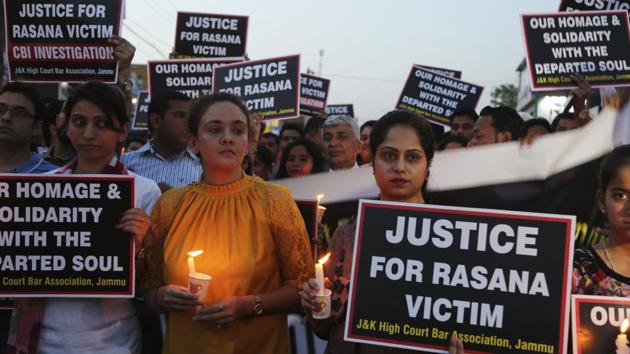Kathua, Unnao rapes reminiscent of December 16 case that shook India
The events that followed the December 16, 2012, incident set the tempo for similar spontaneous, citizen-led protests that hold the government accountable.
Two separate incidents of rape in Jammu and Kashmir and Uttar Pradesh have triggered a spate of citizen-led protests across the country.

The rape and murder of an eight-year-old girl in Kathua, the rape of a teenager in Unnao and the custodial death of her father have led to people from different social and economic backgrounds taking to the streets demanding strict action against the perpetrators. The stir is reminiscent of another peoples’ movement that had rocked the country almost six years ago following the gang rape and the subsequent death of a 23-year-old woman in Delhi.
What happened
On December 16, 2012, a 23-year-old physiotherapy student was returning home with a friend in a chartered bus after watching a movie in a South Delhi mall.
Apart from the duo, there were only six others on the bus, including the driver. As the bus began moving, the culprits started taunting the victim and her friend. Following an altercation with the bus staff, the woman’s friend was beaten up and she was brutally raped and tortured. Her internal organs were damaged using an iron rod. The culprits later threw both the woman and her friend out of the moving bus late at night. Passersby informed the police, which rushed the two to the Safdarjung Hospital.
The woman was transferred to a hospital in Singapore for emergency treatment 11 days after the assault but succumbed to her injuries two days later.
The crime had triggered massive public outrage and demand for justice.
Context
Spontaneous protests broke out across the country as the horror of the December 2016 gang rape unfolded. The victim was given the moniker “Nirbhaya”, meaning the brave one for the way she fought the rapists before being incapacitated. A group of college students marched to the Rashtrapati Bhawan to meet the then President Pranab Mukherjee to demand a strong law to deal with women harassment. The government was eventually forced to take note. A three-member panel headed by retired CJI JS Verma was set up to frame a revamped, strong anti-rape law. The committee’s report formed the basis for the Criminal Law (Amendment) Act in 2013.
This time also the mounting public pressure has prompted the government to act, leading to the arrest of the BJP MLA accused of raping the Unnao teen and the ouster of two BJP ministers, who had supported the Kathua rape accused, from the J&K cabinet.
On Friday, the Centre said it was planning to amend the Protection of Children from Sexual Offence (POCSO) Act, 2012 and seek death penalty for the rape of children below the age of 12 years.
Significance
In a country where crimes against women have increased rapidly in the last decade, the brutality of the December 16 incident stood out. Public protests had taken place earlier too, but the collective outrage and demand for justice that broke out after the Delhi gang rape was unparalleled.
The marches, candle light protests and public rallies organised by the civil society forced the government to come up with a slew of reforms across sectors to bolster women safety. Ensuring that there was no delay in bringing out the revamped laws, the United Progressive Alliance (UPA) government of the time took just four months to change the antiquated rape laws by bringing the Criminal Law (Amendment) Act in April 2013, which provides for life sentence and death penalty for gang rape.
The central government also announced a special Rs 1,000 crore corpus to support the initiatives to increase the security of women. Six fast-track courts were set up to handle rape cases.
The events that followed the December 16 incident set the tempo for similar spontaneous, citizen-led protests that hold the government accountable.






